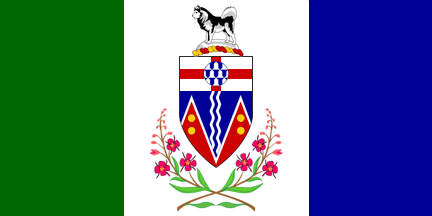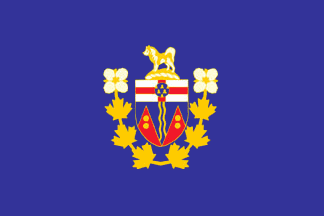 image by Clay Moss, 22 August 2009
image by Clay Moss, 22 August 2009Based on: vectorportal.com

Last modified: 2013-11-09 by rob raeside
Keywords: yukon | canada | huskie | fireweed | maple leaf garland |
Links: FOTW homepage |
search |
disclaimer and copyright |
write us |
mirrors
 image by Clay Moss, 22 August 2009
image by Clay Moss, 22 August 2009
Based on: vectorportal.com
See also:
From the Yukon web site:
Ivan Sache, 29 September 2004The Yukon flag is the product of a territory-wide design competition sponsored by the Whitehorse branch of the Royal Canadian Legion as part of Canada's 1967 centennial year celebrations.
There were 137 submissions. One of the 10 designs submitted by Lynn Lambert of Destruction Bay was among the three final flags selected by a judging committee.
Lambert had just graduated from the drafting program at the Yukon Vocational and Technical Training Centre (now Yukon College) and was motivated by his keen interest in art and his knowledge of the Yukon. Lambert had submitted several designs in hopes of winning the contest. He received formal recognition of his efforts at the opening of the 1967 Trade Show in Whitehorse. His design was officially accepted as the territorial flag in 1968. [on 1 December 1967 according to Chris] The Yukon flag consists of three vertical panels: a central panel of white flanked by a green panel on the inner edge and a blue panel on the outer edge. The Yukon Coat of Arms appears on the central panel framed by two stems of fireweed, the territory's floral emblem. The blue represents the Yukon's rivers and lakes, the green symbolizes the forests and white signifies snow.
The territorial arms received Royal Assent on 24 February 1956, and the flag
(winning entry in a design competition) was adopted by a 'Flag Act' of 1 December
1967. The colours were laid down in the Act as green 503-115, blue 502-204 and
red 509-103 all conforming to the Canadian Government Specification Board Standard
Paint Colours, Part One, No.1.GP-12c, 1965.
Christopher Southworth, 14 March 2003
Flag of the Yukon
1(1) The flag described in the Schedule is hereby
adopted as the flag of the Yukon.
(2) A sample of the flag of the
Yukon, in coloured textile material, is on deposit in the offices of the
Minister; in any manufacture or representation of the flag of the Yukon, the
colours used shall so far as is practicable match the colours shown in the
sample. R.S., c.68, s1.-
Schedule
The flag consists of
three vertical panels, the centre panel being one and one-half times the
width of each of the other two panels. The panel adjacent to the mast is
coloured green (503-515), the centre panel is coloured white and has the
Yukon crest disposed above a symbolic representation of the floral emblem of
the Yukon, Epilobium angustifolium, and the panel on the fly is
coloured blue (502-204). The stem and leaves of the floral emblem are
coloured green (503-115), and the flowers thereof are coloured red
(509-103). The Yukon crest is coloured red (509-103), and blue (502-204),
with the Malamute dog coloured black. (Code numbers are references to the
Canadian Government Specifications Board publication known as the Standard
Paint Colours, Part I, and numbered 1-GP-12c, 1965.)
http://www.gov.yk.ca/legislation/acts/flag.pdf - Flag Act
The
coat of arms is described in the Government of Yukon's website as follows:
"A red, blue, gold and white shield surmounted by a malamute (or husky)
standing on a mound of snow. Wavy vertical white and blue stripes represent
the Yukon River and the gold-bearing creeks of the Klondike. Red spire-like
forms represent the territory's mountains and the gold circles within
symbolize mineral resources. At the top of the shield is a cross of St.
George in recognition of the early English explorers and a "roundel in vair"
as a symbol of the fur trade.
The Yukon's Coat of Arms was
commissioned by the federal Department of Indian Affairs and Northern
Development and designed by well-known heraldry expert Alan Beddoe in the
early 1950's. It was approved officially by Queen Elizabeth II in February
1956."
http://www.gov.yk.ca/aboutyukon/emblemsandsymbols.html#Coat_of_Arms -
Government of Yukon's website
The coat of arms was registered on 15
October 2006 on the Public Register of Arms, Flags and Badges, Vol. V, p.
74, as announced on 17 March 2007 in the Canada Gazette, Vol. 141, p. 587.
Blazon
Arms
Azure two pallets wavy argent between two piles
reversed gules fimbriated argent, each charged with two bezants, on a chief
argent a cross gules surmounted by a roundel vair;
Crest
A husky
statant on a mount of snow proper;.
http://archive.gg.ca/heraldry/pub-reg/project.asp?lang=e&ProjectID=1081
- Public Register of Arms, Flags and Badges
The official flower is
described in the Government of Yukon's website as follows:
"Fireweed (Epilobium
angustifolium) was chosen as Yukon's floral emblem in 1957. It is a
hardy plant and grows along Yukon roadsides, river bars and clearings from
mid-July to September. Its blooms are a bright magenta, making it one of the
most attractive plants in the North. Itís also one of the first plants to
appear after a forest fire."
http://www.gov.yk.ca/aboutyukon/emblemsandsymbols.html#Official_Flower -
Government of Yukon's website
The Floral Emblem Act is, as Chapter
92, in the Revised Statutes of the Yukon 2002.
"Floral Emblem Act
Adoption of floral emblem
1. The flower known
botanically as Epilobium angustifolium and popularly known s 'fireweed'
is adopted and shall be deemed to be the floral emblem of Yukon. R.S., c.69,
s.1."
http://www.gov.yk.ca/legislation/acts/flem.pdf - Floral Emblem Act
Ivan ache, 3 August 2012
 image by Eugene Ipavec, 5 August 2008
image by Eugene Ipavec, 5 August 2008
From the Commissioner's website:
The Commissioner's Coat of Arms shows the Yukon Coat of Arms surrounded by six gold maple leaves to denote the territory of Yukon. Two blossoms of fireweed sit atop the maple leaves. This Coat of Arms can be used on a flag or standard with a royal blue background. The standard can be used on an official vehicle or flown outside a building when the Commissioner is in attendance.
Valentin Poposki, 30 July 2008